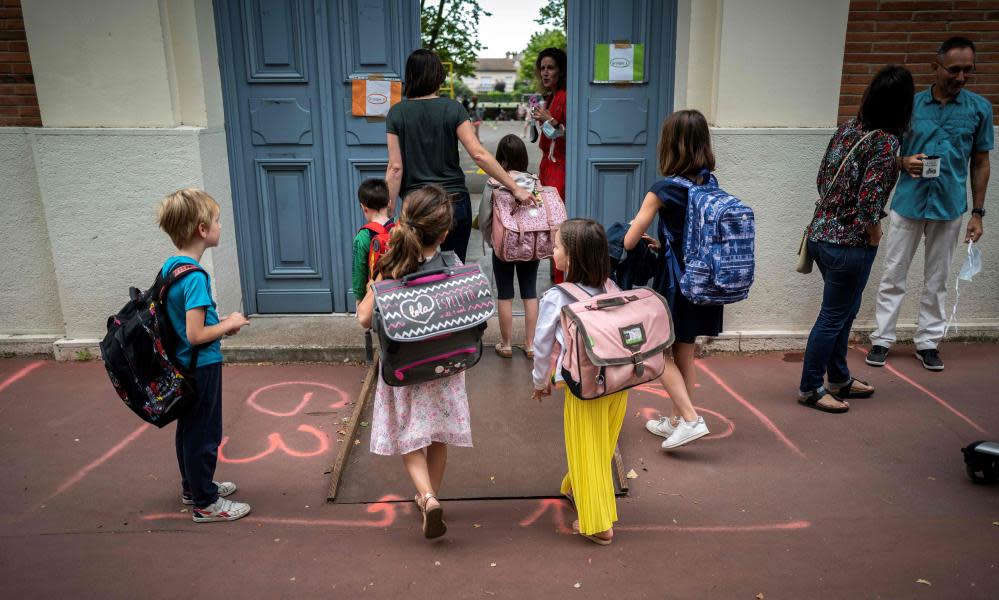Reopening schools: how different countries are tackling Covid dilemma

As schools in England and Wales get set to reopen amid continued controversy over safe conditions, attention has focused on potential evidence of coronavirus transmission in the classroom and on the experiences of other countries.
Research on the ability of children of different ages to catch and transmit the virus is contradictory, and differences in education systems and social conventions make comparisons difficult.
One complicating factor is what epidemiologists call contact matrices: the degree to which different age groups mix, particularly within extended multigenerational families, which can vary from society to society and from group to group within a society.
Countries have taken different approaches but some of the questions are broadly familiar. Should all children and staff be required to wear masks, or only some age groups? Should children be tested for the virus? How should social distancing be managed in the classroom and playground? And finally, should schools be reopening at all?
France
With a recent sharp resurgence in virus cases, France has issued some of the most detailed guidelines for when schools reopen. Children in secondary schools will have to wear face coverings at all times when in school and in the playground, the education minister said on Thursday, as France reported a record number of daily coronavirus cases since the easing of restrictions.
This is a change from recommendations in July that face coverings for older children would only be necessary where 1-metre social distancing could not be managed, and is a response to concerns from teaching unions about rising infections as the summer has gone on.
While there were class size restrictions when French schools first reopened, in the new term there will be no size limits and the 1-metre social rule is advised but is not mandatory.
Poland
Poland plans to reopen schools next week for the first time since mid-March despite reaching a record high number of daily registered coronavirus infections late last week.
It has said it will not mandate mask wearing for children in the classroom. However, it has said individual principals can decide to impose face coverings in school halls and locker rooms. Unlike in some other countries, no temperature checks at the school gates will be introduced.
Belgium
With one of the world’s highest per capita death rates from Covid-19 during the pandemic, Belgium has looked closely at the issue of masks in the classroom. When schools reopen on 1 September all children aged 12 and above and teachers will be required to wear masks, following an announcement by the prime minister, Sophie Wilmès, last week.
“The goal is to avoid a second wave,” she told a news conference. “We see today that the situation is stabilising and improving. It is very important that children go to school.”
Germany
Germany has drawn attention in recent days because of the experience of Berlin where, after reopening in the last fortnight, several dozen schools have had to close because of infections.
Officials say most infections in Berlin involve only one teacher or student, and suggest that the transmission occurred outside the school.
Berlin has responded by closing schools for very brief periods to allow contact tracing. “So far, these are isolated cases and not outbreaks,” Valerie Kirchberger, a paediatrician and coordinator of Berlin’s testing strategy, led by Charité hospital, told local media.
Unlike in countries where education is organised on a national level, German schools are run regionally. While some German states have made face coverings mandatory at all times in schools, in others they are compulsory only in hallways and playgrounds. More generally, schools across the country have tried to manage the risk of infection by keeping classes separate.
South Korea
Regarded as one of the world’s most intensive education systems, South Korea struggled with reopening, delaying restarting schools multiple times and then phasing in different age groups.
While a resurgence of infections in the country forced schools to close again, they have resorted to numerous tactics to keep operating, including attendance on alternate days and temperature checks.
Denmark
One of the first western countries to reopen its schools, in April, Denmark separated younger children into “micro-groups” of 12 known as “protective bubbles”.
With school starting times staggered and desks 2 metres apart, masks were not deemed necessary. However, Denmark had relatively low infection numbers in the wider population, the result of quick and effective early suppression of the kind advocated by the British public health expert Devi Sridhar, who has emphasised that suppressing community transmission is ultimately what will make schools safe.
As of 18 May, children aged 12-16 had returned to secondary schools following similar rules.
Israel
Israel has emerged as one of the major cautionary tales. Having managed its initial outbreak relatively successfully, it reopened its schools in May, initially sending a limited number of classes children back in small “capsules” to minimise the risk of transmission. In a surprise move, however, the government then announced that all grades could return and lifted restrictions on class sizes.
The reopening contributed to a resurgence of the virus, with tens of thousands of pupils later sent into quarantine as their classmates tested positive.
Kenya
Underlining the differing considerations in different parts of the world, Kenya’s schools will not reopen until at least January. As David Lagakos and Emilie Yam wrote in a piece for the World Economic Forum’s website, “low-income countries face a very different set of circumstances from high-income countries – for example, a higher proportion of households that include both children and elderly people … and the urgency of maintaining the livelihoods of working-age adults to prevent hunger and poverty.”
With a school year running from January to November, officials have relied on the Kenya Institute of Curriculum Development to run school programmes via the radio, TV and internet since students stopped going to classes in March.

 Yahoo News
Yahoo News 
